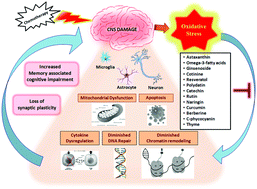Dietary agents in mitigating chemotherapy-related cognitive impairment (chemobrain or chemofog): first review addressing the benefits, gaps, challenges and ways forward
Abstract
Chemobrain or chemofog is one of the important but less investigated side effects, where the cancer survivors treated with chemotherapy develop long-term cognitive impairments, affecting their quality of life. The biological mechanisms triggering the development of chemobrain are largely unknown. However, a literature study suggests the generation of free radicals, oxidative stress, inflammatory cytokines, epigenetic chromatin remodeling, decreased neurogenesis, secretion of brain-derived neurotropic factor (BDNF), dendritic branching, and neurotransmitter release to be the cumulative contributions to the ailment. Unfortunately, there is no means to prevent/mitigate the development and intensity of chemobrain. Given the lack of effective prevention strategies or treatments, preclinical studies have been underway to ascertain the usefulness of natural products in mitigating chemobrain in the recent past. Natural products used in diets have been shown to provide beneficial effects by inhibition of free radicals, oxidative stress, inflammatory processes, and/or concomitant upregulation of various cell survival proteins. For the first time, this review focuses on the published effects of astaxanthin, omega-3 fatty acids, ginsenoside, cotinine, resveratrol, polydatin, catechin, rutin, naringin, curcumin, dehydrozingerone, berberine, C-phycocyanin, the higher fungi Cordyceps militaris, thyme (Thymus vulgaris) and polyherbal formulation Mulmina™ in mitigating cognitive impairments in preclinical models of study, and also addresses their potential neuro-therapeutic mechanisms and applications in preventing/ameliorating chemobrain.



 Please wait while we load your content...
Please wait while we load your content...